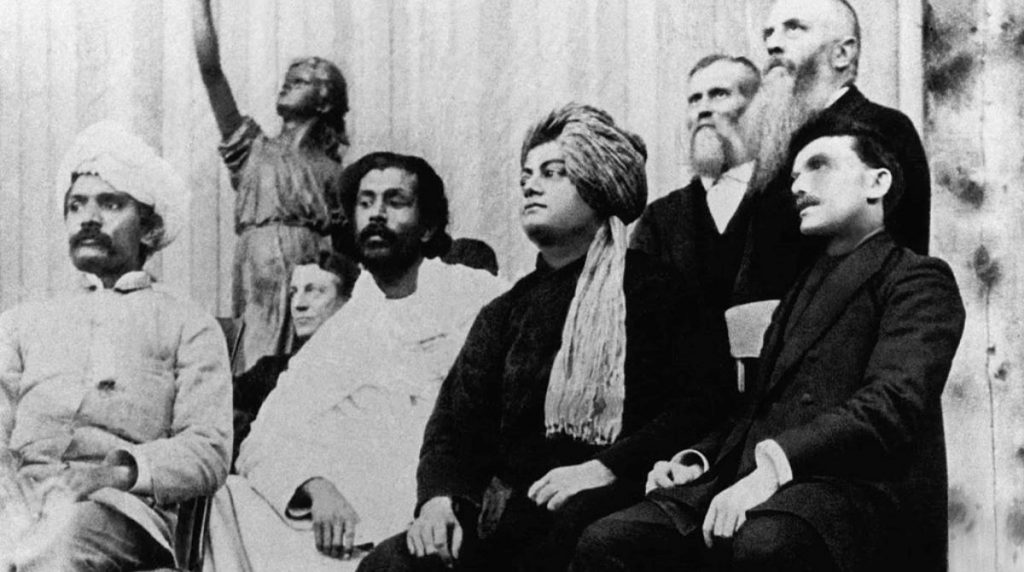It is September 11, on this day in 1893 the famous Indian monk Swami Vivekananda gave his speech for the ages in the World Parliament of Religions, Chicago, introducing Hinduism to the world, with the uplifting messages of universal tolerance and acceptance.
For the uninitiated, Swami Vivekananda was a famous philosopher, religious teacher, author and a global personality. He was born in 1863, Kolkata as Narendranath Dutta. From a young age he was an avid reader consuming the works of Indian spirituality like the Vedas and Upanishads while also establishing a foothold in western philosphy and european history. Being spiritually inclined Narendra found himself a guru in the shape of the great mystic Swami Ramakrishna Paramhansa.
He was given the name of Vivekananda which means, the bliss of earning wisdom. After his spritual initiation, Vivekananda decided to begin his life anew, as a wandering monk. He travelled across India for five years developing a deep understanding of the public and their struggles which later helped him make the resolve to give his utmost in the upliftment of the nation.
Once Vivekananda gained a diverse understanding of the country he decided to continue his journeys, this time with an aim to gain a real time perspective of the West. On 31 May 1893 Vivekananda began by visiting several cities in Japan (including Nagasaki, Kobe, Yokohama, Osaka, Kyoto and Tokyo), then travelling to China and Canada en route to the United States. He reached Chicago on 30 July 1893, where the “Parliament of Religions” took place on 11 September 1893. The Congress was an initiative to gather all the religions of the world, and show “the substantial unity of many religions in the good deeds of the religious life.”
Taking the blessings of Mother Saraswati, Vivekananda began his speech with an adress to the crowd, “Sisters and Brothers of America, It fills my heart with joy unspeakable to rise in response to the warm and cordial welcome which you have given us. I thank you in the name of the most ancient order of monks in the world, I thank you in the name of the mother of religions, and I thank you in the name of millions and millions of Hindu people of all classes and sects.” At these words Vivekananda recieved a two minute standing ovation from the seven thousand strong crowd.
He continued by extolling the virtues of tolerance practised by Hindus, who have accomodated people from all cultures and religions. Giving shelter to refugees from Israel to Iran. Vivekananda quoted two illustrative passages from the “Shiva mahimna stotram”: “As the different streams having their sources in different places all mingle their water in the sea, so, O Lord, the different paths which men take, through different tendencies, various though they appear, crooked or straight, all lead to Thee!” and “Whosoever comes to Me, through whatsoever form, I reach him; all men are struggling through paths that in the end lead to Me.”
Post his iconic speech, Parliament President John Henry Barrows said, “India, the Mother of religions was represented by Swami Vivekananda, the Orange-monk who exercised the most wonderful influence over his auditors”. Vivekananda attracted widespread attention in the press, which called him the “cyclonic monk from India”. The New York Herald noted, “Vivekananda is undoubtedly the greatest figure in the Parliament of Religions. After hearing him we feel how foolish it is to send missionaries to this learned nation”. American newspapers reported Vivekananda as “the greatest figure in the parliament of religions” and “the most popular and influential man in the parliament”. He spoke several more times at receptions, the scientific section, and private homes on topics related to Hinduism, Buddhism and harmony among religions until the parliament ended on 27 September 1893. Vivekananda’s speeches at the Parliament had the common theme of universality, emphasizing religious tolerance.
It has been 131 years since the enigmatic Swami Vivekananda gave his US address, but his legacy was cemented that day on September 11 as one of the greatest spiritual ideologues and philosophers of the modern era. His outreach to the west and his global promotion of Hinduism still remains unparalleled. It is imperative that the Hindus of today continue to learn and imbibe the qualities of a remarkable man who once brought the East to the west in the most spectacular of fashions.
